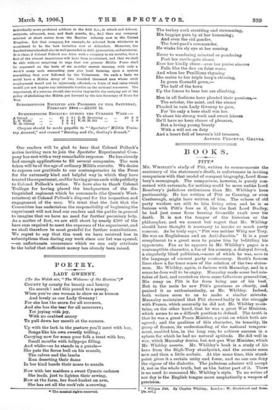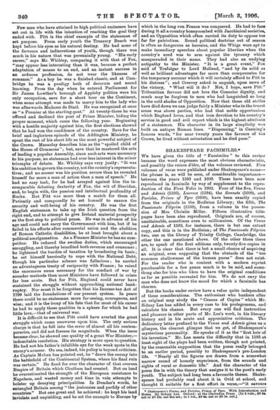BOOKS.
PITT.*
Mn. WHIBLET'S study of Pitt, written to commemorate the centenary of the statesman's death, is unfortunate in inviting comparison with that model of compact biography, Lord Rose- bery's monograph. The comparison, however, is purely con- cerned with externals, for nothing could be more unlike Lord Rosebery's judicious enthusiasm than Mr. Whibley's keen partisanship. He has written of Pitt as Canning, or even Castlereagh, might have written of him. The echoes of old party warfare are still to him living cries, and he is as furious with Pitt's foes as if, like the first Lord Dudley, he had just come from hearing Grenville exult over his death. It is not the temper of the historian or the philosopher, and we cannot but regret that Mr. Whibley should have thought it necessary to invoke so much party rancour. As he truly says, "Pitt was neither Whig nor Tory. He was an Englishman and an Anti-Jacobin." It is a poor compliment to a great man to praise him by belittling his opponents. Fox as he appears in Mr. Whibley's pages is a contemptible character, a foe of his country, a disloyal friend, a singularly blind politician,—none of which he was, save in the language of current party controversy. Scott's famous lines show a far truer sense of the relation of the two states- men. Mr. Whibley, again, is furious with Macaulay, and in a sense he does well to be angry. Macaulay made some bad mis- takes of fact, and erected on them some fallacious generalities., His essay on Pitt is far from being one of his beat. But in the main he saw Pitt's greatness as clearly, and praised it as enthusiastically, as Mr. Whibley. Indeed, both writers seem to us to make a similar mistake. Macaulay maintained that Pitt showed badly in the struggle with France, which assuredly he did not. Mr. Whibley main- tains, on the other hand, that he was a great War Minister, which seems to us a difficult position to defend. The truth is that he was a great Peace Minister, a point on which both are agreed ; and the qualities of this character, its tenacity, its grasp of finance, its understanding of the national tempera- ment, enabled him, in the long run, to achieve success in a sphere for which be had no natural aptitude. He did well in war, which Macaulay denies, but not qua War Minister, which Mr. Whibley asserts. Mr. Whibley's book is a study of his hero from the High-Tory standpoint, and the accents seam now and then a little archaic. At the same time, this stand- point gives it a certain unity and force, and no one can deny the vigour of the dialectic. The judicious admirer will accept it, not as the whole truth, but as the better part of it. There is no need to commend Mr. Whibley's style. To no writer of our day is the English tongue more emphatically a weapon of precision.
• William Pitt. By Ch,strles Whibley, London: W. Blackwood and Sous. Dia net.]
Few men who have attained to high political eminence have set out in life with the intention of reaching the goal they ended with. Pitt is the chief example of the statesman of set purpose. From early youth the Treasury Bench was kept before his eyes as his natural destiny. He had none of the fervours and indiscretions of youth, though there was much in his nature that was perennially young. "His early career," says Mr. Whibley, comparing it with that of Fox, "may appear less interesting than it was, because a perfect adaptation of means to an end, and an instant success in an arduous profession, do not wear the likeness of romance." As a boy he was a finished classic, and at Cam- bridge he was a prodigy both of decorum and sound learning. From the day when he entered Parliament for Sir James Lowther's borough of Appleby politics were his only occupation, save for a short tour on the Continent, when some attempt was made to marry him to the lady who was afterwards Madame de Stael. He was recognised at once as "a Premier at the starting-post." At twenty-three he was offered and declined the post of Prime Minister, biding the proper moment, which came the following year. Beginning with a hostile majority against him, the first elections showed that he had won the confidence of the country. Save for the brief and inglorious episode of the Addington Ministry, he spent the rest of his short life as the most powerful subject of the Crown. Macaulay describes him as the "spoiled child of the House of Commons"; but, save that he mastered the arts of leading a popular Assembly, since such arts were necessary to his purpose, no statesman had ever less interest in the minor triumphs of debate. Mr. Whibley says very justly : "It was his ambition to govern the country, not the country's representa- tives; and no sooner was his position secure than he revealed himself far more a man of action than a man of speech." He had no easy task, for be had arrayed against him the in- comparable debating dexterity of Fox, the wit of Sheridan, and, to begin with, the passion and intellectual profundity of Burke. But Pitt was more than a match for them all. Patiently and composedly be set himself to ensure the security and well-being of his country. He was the first English statesman to take up the Irish question from the right end, and to attempt to give Ireland material prosperity as the first step to political peace. He was in advance of his age and could not carry the Government with him, but if he failed in his efforts after commercial union and the abolition of Roman Catholic disabilities, he at least brought about a political amalgamation. As a Finance Minister he has no com- petitor. He reduced the swollen duties, which encouraged smuggling, and thereby benefited both revenue and consumer ; he lightened the burden of taxation by broadening its basis ; he set himself heroically to cope with the National Debt, though his particular scheme was fallacious ; he carried an advantageous treaty of reciprocity with France ; he raised the enormous sums necessary for the conduct of war by sounder methods than most Ministers have followed in crises far less acute. But for Pitt, England could never have sustained the struggle without approaching national bank- ruptcy. Nor must it be forgotten that his Income-tax Act of 1799 laid the foundations of our present system. In peace there could be no statesman more far-seeing, courageous, and wise; and it is the irony of his fate that for most of his career he had to apply these qualities in a sphere for which he had little love,—that of universal war.
It is difficult to see that Pitt could have averted the great struggle which came unawares upon him. The only serious charge is that he fell into the error of almost all his contem- poraries, and did not foresee its magnitude. When the issue became clear, be showed one quality of a great War Minister,— indomitable resolution. His strategy is more open to question. He had not his father's infallible eye for the weak spots in the enemy's armour. On sea, indeed, his policy is beyond criticism. As Captain Mahan has pointed out, he "drove the enemy into the battlefield of the Continental System, where his final ruin was certain." He fixed for ever the character of that oversea Empire of Britain which Chatham had created. But on land he overestimated the strength of the European resistance to Napoleon, and wasted money and time in vain attempts to bolster up decaying principalities. In Dundas'a words, he entangled Britain among "the jealousies and perfidy of other countries." But one great end he achieved : he kept his land inviolate and unyielding, and he set the example to Europe by which in the long run France was conquered. He had to face during it all a country honeycombed with Jacobinical societies, and an Opposition which often carried its duty to oppose too far for patriotism. Sound political doctrine out of season is often as dangerous as heresies, and the Whigs were apt to make incendiary speeches about popular liberties when the country's need was to arm against the tyranny which masqueraded in their name. They had also an undying antipathy to the Minister. "It is a great event," Fox said of Trafalgar to Lord Holland, "and by its solid as well as brilliant advantages far more than compensates for the temporary succour which it will certainly afford to Pitt in his distress " ; and Creevey asked in anguish, upon news of the victory, 6- What will it do ? Not, I hope, save Pitt." Tribunitian fervour did not love the Consular dignity, and much may be forgiven to men who had languished so long in the cold shades of Opposition. Now that these old strifes have died down we can judge fairly a Minister who in the truest sense was above parties, who had that noble opportunism which England loves, and that iron devotion to his country's service in good and evil report which is the highest attribute of a statesman. His character in its large simplicity was built on antique Roman lines. "Dispensing," in Canning's famous words, "for near twenty years the favours of the Crown, he lived without ostentation and he died poor."















































 Previous page
Previous page